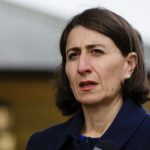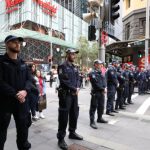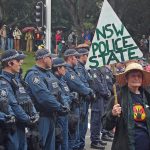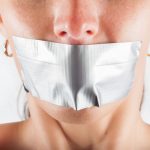The NSW Government’s Relentless Assault on Civil Liberties

As the state election is looming, political commentators all agree that the results are going to be tight, so it might be a good time to reflect on the assault the O’Farrell/ Baird/ Berejiklian government has perpetrated upon NSW citizens’ civil liberties during its time in office.
From the lockout laws to increased policing powers and the stifling of public protest, the Liberal Nationals government has consistently been whittling away at basic freedoms that used to be a given, but are now increasingly becoming a distant memory.
Just this week, premier Berejiklian and retiring police minister Troy Grant announced a new pilot program that would allow NSW police to conduct warrantless searches of the homes and cars of people who have been convicted of a serious drug offence in the past ten years.
This is yet another tough-on-drugs measure the government’s has proposed following the five drug-related deaths at festivals over the last summer. And what it reveals is a conservative government that would rather remove further legal safeguards than admit the war on drugs has failed.
And it’s these sort of reactionary moves that make it high time that the reign of the Coalition dinosaurs is brought to an end. And below are examples of other bad policy decisions that should remind us that it’s time to vote this lot out.
The death of city nightlife
Under the O’Farrell government, in February 2014, the lockout laws came into play. This means that all licenced venues in the CBD, Darlinghurst and Kings Cross have to lock people out at 1.30 am and last drinks have to be called a 3 am.
These laws were said to be in response to the one punch deaths of two 18-year-old men on the side of the road in Kings Cross. Both these incidents that occurred within a year and a half of each other took place before 11 pm, so it’s still a mystery how the lockouts prevent such crimes.
But, what the implementation of the lockouts did do, was it killed the city’s nightlife. Over 170 venues have since closed down, along with numerous related business. And what used to be an internationally renowned city, has now become a global laughing stock.
Dilution of the right to silence
The O’Farrell also succeeded in passing changes to the law which significantly curtail one of the most fundamental rights in a democratic society, the right to silence.
The passing of the Evidence of Amendment (Evidence of Silence) Bill 2013 led to the insertion of a new section 89A into the Evidence Act 1995 (NSW), the effect of which is to remove a person’s right to silence whenever they are represented by a lawyer at the police station for a serious indictable offence – which is any offence that attracts a maximum penalty of at least 5 years in prison.
The section stipulates that an adverse inference can be drawn from a suspect’s silence in those circumstances, which can later be used against them in a court of law.
As foreshadowed at the time, the change has led to lawyers being kept out of police stations due to concerns their presence will jeopardise their clients’ right to silence, and – much to the delight of police – has given them open slather to pressure and use unethical, improper and underhanded tactics to elicit the version of events they are after; whether consistent with the truth or otherwise.
Baird’s draconian law bonanza
In the first half of 2016, reigning premier Mike Baird went on a spree of drafting new laws designed to further encroach upon citizens’ rights. Initially, in mid-March that year, the inclosed lands anti-protest amendment bill was passed in parliament.
The legislation that was all about propping up the interests of large mining companies at the expense of the public, expanded police powers to counter protests and introduced a maximum penalty of up to 7 years in gaol for hindering the operations of a mine.
And on 4 May that year, two bills were passed that further eroded civil liberties. The Organised Crime and Public Safety Act 2016 allows senior police to issue public safety orders without court oversight. These can ban a person from a place or an event for up to 72 hours a week.
While the Crimes (Serious Crime Prevention Orders) Act 2016 provides that courts can issue directives restricting several aspects of a person’s life – including employment, movement and association – all without proof that they’ve committed or even facilitated a crime.
Silencing dissent
New legislation governing Crown land management came into effect on 1 July last year. At the time the Berejiklian government was drafting it, the politicians failed to remove the restrictions on protests on 40 percent of NSW land, but rather they increased the penalties that apply to it.
The legislation contained a list of activities that are outlawed on Crown lands, which includes “taking part in any gathering, meeting or assembly,” except at cemeteries. NSW Greens MLC David Shoebridge moved a motion to disallow this provision, but the government prevented debate on it.
“This government has consistently attacked the right to protest and now they won’t even let parliament debate the issue,” Mr Shoebridge told Sydney Criminal Lawyers® in July last year. “NSW is moving closer and closer to a police state.”
NSW: The premier police state
Despite the fact recent statistics show that crime rates in NSW are at their lowest in decades, Ms Berejiklian announced in November last year that if she takes out the coming election, her government is going to invest in 1,500 more police over the next four years.
The increased investment in policing comes after the Liberal Nationals government has already seen more than 1,000 additional officers hitting the streets since it came to power back in March 2011. And it also comes amid growing concerns about over-policing at events and abuses of police powers.
But the Coalition isn’t only interested in having the ability to arrest more of its constituents, but it also wants to incarcerate more. Since a $3.8 billion prison package was announced at the 2016 budget, the government has had a focus on expanding the capacity of the prison system.
This funding provides for an extra 7,000 prison beds by next year. And this will allow NSW authorities to be able to detain around 50 percent more inmates in this state’s correctional centres. Many of the facilities have already been expanded or reopened.
The war on festivals
And Gladys’ latest foray is the assault she’s been conducting on NSW music festivals. Following the deaths of two young Australians at the Defqon.1 festival on 15 September, the premier came out screaming that her solution to the drug deaths was to shut down the festival.
This resulted in widespread outcry as members of the community pointed to the harm reduction approach of pill testing as a way of reducing the risk of drug-related fatalities. Berejiklian responded saying she wouldn’t shut down the event, but rather she’d convene a festival safety panel.
However, the panel was ordered not to consider pill testing. And amongst its recommendations was an overbearing festival licensing scheme, which targeted every event in NSW. And it even saw festivals close down due to extra policing costs prior to its implementation.
Then after massive backlash from the industry, the premier came out and said the festival licensing scheme only applied to 14 festivals, which all involve young people and electronic dance music. And of course, Defqon.1 is on the list.
And all these examples reveal that the Coalition isn’t listening. And whether it’s via drafting draconian laws, increasing law enforcement, taking away the right to voice opposition, or simply stamping out a good time, this lot have been waging a war on our freedoms, and it’s time they go.








